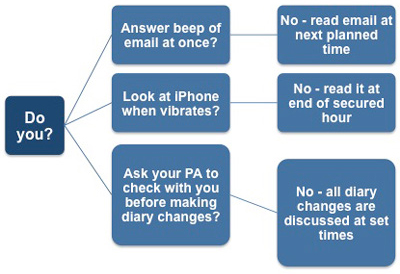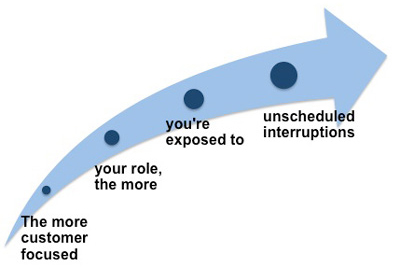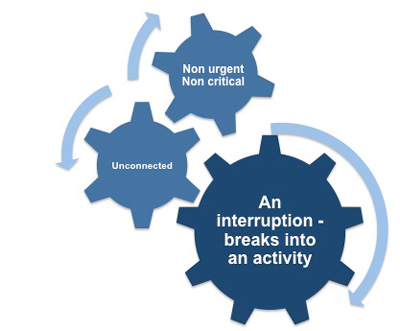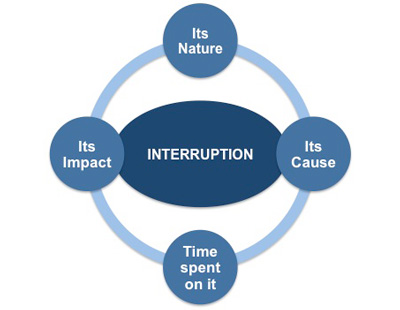Controlling Interruptions at Work
A key element of your own productivity is ensuring you maintain good working relationships with all colleagues and external partners.
This doesn't mean that you have to be 'on call' to them whenever they perceive a need to see or speak with you. You need to appear accessible to these people in a controlled manner and set their expectations in terms of a response in accordance with the nature of the interruption.
 |
Using your interruption screens will also help you to assess the level of urgency of interruptions, allowing you to prioritize. For example, you have just secured yourself an hour in an empty meeting room to plan your presentation for the next board meeting.
• Do you answer the beep of a new email?
• Do you look to see who is calling when your phone vibrates?
• Do you ask your PA to check with you before making any diary changes?
• The answer to all these questions is 'No'.
 |
Within this schedule you can designate certain periods of time as being totally protected from interruptions and others where you will tolerate a planned disruption. It is for these latter periods of time that you will need to prioritize when and how to manage the interruptions.
You will have to be very protective of these periods of time and do your utmost to allocate time to resolve issues raised by interruptions into your 'free time' in your diary.
The most effective way to achieve this is by ensuring your schedule clearly shows to anyone who has access to your diary that these periods of time are committed periods and are not open to negotiation by others.
The number and length of these periods will alter depending on your role and organization. The greater degree of 'Customer Focus' your role has, the greater number of unscheduled interruptions you are likely to face due to the nature of your role within the organization.
You will need to strongly defend your protected time in a polite and constructive manner.
 |
In order to protect such periods, you may delegate the prioritizing of such interruptions to senior members of your team or department. You may need to mentor and coach your selected individuals in this role so that your time is properly protected. If your role is more autonomous, you may want to work in conjunction with a colleague where you manage each other's interruptions during protected periods.
One can define an interruption as: 'Something that breaks into an activity.' This break is not connected to that activity, nor is it an urgent or critical issue that requires immediate attention.
 |
If your role requires you to complete a time log, it will be easier for you to identify those tasks that distracted you from your objective and the amount of time it took to sort out this disruption. If your time log requires you to detail who instigates or requests such interruptions, you have most of the information you need to determine the cost of such interruptions in terms of time and productivity.
For many mangers this information is not readily available, so you will need to create your own time log in order to gather it. This can be a simple note in your diary, PDA, or BlackBerry, which details key facts about the interruption.
Those key facts are:
 |
Once you have a week or two of such data, you will then be able to see if there are any trends to these interruptions.
- Is there a pattern emerging? For example, most interruptions are between 10-12pm.
- Were they important?
- How many were inescapable?
- What proportion of your time was taken up with interruptions?
- What were the main causes? Was it people or events?
If you can see a pattern to certain types of interruptions, or that a specific person or department is the cause of the majority of them, you will be able to develop a strategy and adopt techniques to alleviate the source of your disruption.
You may also be interested in:
Handling Interruptions | Identifying Interruptions | Limiting Inappropriate Socializing | Techniques to Minimize Interruptions | Managing Phone Interruptions | Cold Call Elimination | Managing Your Outbound Calls | How to Stop Constantly Checking Emails.



